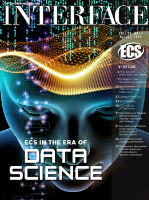
Electrochemical Society Interface
Scope & Guideline
Transforming Electrochemical Discoveries into Practical Advances
Introduction
Aims and Scopes
- Electrochemical Energy Storage:
Research related to batteries, supercapacitors, and fuel cells, focusing on enhancing performance, efficiency, and sustainability of energy storage technologies. - Electrodeposition Techniques:
Exploration of advancements in electrodeposition methods for material fabrication, with particular attention to precision manufacturing and environmental impact. - Electrochemical Sensors and Sensing Technologies:
Development and application of electrochemical sensors for various fields, including environmental monitoring, agriculture, and healthcare. - Sustainability and Green Chemistry:
Research aimed at promoting sustainable practices in electrochemical processes, including recycling, resource recovery, and the development of clean energy technologies. - Artificial Intelligence in Electrochemistry:
Integration of AI and machine learning techniques to enhance electrochemical research and applications, particularly in predictive modeling and data analysis. - Corrosion Science and Materials Integrity:
Investigations into corrosion mechanisms and prevention strategies, focusing on materials used in harsh environments.
Trending and Emerging
- Advanced Battery Technologies:
A surge in research focusing on innovative battery technologies, including solid-state batteries and sodium-ion batteries, which are seen as viable alternatives to lithium-ion systems. - Sustainable Electrochemical Processes:
Increased emphasis on sustainability, with research targeting electrochemical methods for recycling and resource recovery, particularly in the context of critical materials and waste management. - Integration of AI in Electrochemical Research:
Growing interest in leveraging artificial intelligence and machine learning to optimize electrochemical processes, enhance material discovery, and improve sensor technologies. - Electrochemical Innovations for Green Energy:
A trend towards exploring electrochemical technologies that support green energy initiatives, such as hydrogen production and carbon capture, reflecting a broader commitment to addressing climate change. - Smart Agriculture Applications:
Emerging research on multifunctional sensors and electrochemical methods tailored for sustainable agriculture, highlighting the role of electrochemistry in enhancing food production efficiency.
Declining or Waning
- Traditional Battery Technologies:
There has been a noticeable decline in papers focusing on conventional battery technologies as research increasingly shifts towards next-generation solutions such as solid-state and sodium-ion batteries. - Historical Perspectives on Electrochemistry:
Papers that provide historical insights or retrospective analyses of electrochemical technologies have become less frequent, indicating a shift towards more forward-looking and application-oriented research. - Electrochemical Processes in Non-Energy Applications:
Research on electrochemical applications outside of energy storage, such as industrial processes that do not directly relate to sustainability, appears to be diminishing in favor of more impactful areas.
Similar Journals
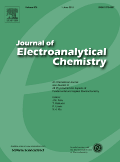
Journal of Electroanalytical Chemistry
Fostering Excellence in Electrochemical ResearchThe Journal of Electroanalytical Chemistry, published by Elsevier Science SA, stands as a leading platform for the dissemination of cutting-edge research in the field of electroanalytical science. With an impressive impact factor that reflects its esteemed reputation—ranking in the Q1 category for both Analytical Chemistry and Chemical Engineering, alongside a strong presence in Electrochemistry—this journal provides a vital resource for researchers, professionals, and students alike. Covering topics from fundamental electrochemical processes to innovative analytical techniques, the journal aims to foster an in-depth understanding and discussion of contemporary advancements in electroanalytical methodologies. Operating under a model that prioritizes quality and rigor, it facilitates access to high-quality manuscripts and reviews that contribute to the advancement of the field. For over six decades, from 1959 to 2024, it has played an intrinsic role in shaping the landscape of electrochemistry, continually driving forward the frontiers of knowledge and application.

Portugaliae Electrochimica Acta
Pioneering Research in Electrochemistry Since 2008Portugaliae Electrochimica Acta is a distinguished journal dedicated to the field of electrochemistry, published by the SOCIEDADE PORTUGUESA ELECTROQUIMICA. With a notable ISSN of 0872-1904, this journal serves as a vital resource for researchers, professionals, and students interested in advancing their understanding of electrochemical processes. Though it is currently categorized in Q4 in the 2023 Electrochemistry rankings, the journal contributes significantly to the academic discourse from its base in Coimbra, Portugal. The journal's timeline spans actively from 2008 to 2025, ensuring a sustained engagement with emerging research. While the journal does not offer open access options, it remains an authoritative source noted for promoting innovative electrochemical research and fostering academic connections within the discipline. Researchers are encouraged to submit their findings and explore the latest contributions to this expanding field.

Battery Energy
Empowering Innovation in Energy Storage.Battery Energy is a pioneering open-access journal established by Wiley in 2022, dedicated to the dynamic field of energy storage and battery technologies. With an E-ISSN of 2768-1696, this journal plays a pivotal role in disseminating innovative research and advancements pertinent to the energy sector, including renewable energy solutions and sustainability practices. It holds a respectable position in Scopus rankings, being placed 32nd out of 78 in the Energy category and 130th out of 270 in Renewable Energy, Sustainability, and the Environment, showcasing its growing impact within the academic community. The journal aims to provide an inclusive platform for researchers, professionals, and students to share insights, foster collaboration, and tackle the pressing challenges associated with battery energy storage. By promoting open access, Battery Energy ensures that cutting-edge research is readily available to a global audience, facilitating the continued evolution of battery technologies for a sustainable future.

Energy Materials
Exploring Breakthroughs in Energy Materials Science.Energy Materials is a pioneering journal published by OAE PUBLISHING INC, dedicated to the dynamic field of energy materials science and engineering. With a focus on advancing knowledge related to materials used in various energy applications such as batteries, fuel cells, and solar cells, this open-access journal aims to disseminate cutting-edge research and innovative methodologies to a global audience. By offering a platform for original research, reviews, and case studies, Energy Materials plays a crucial role in bridging the gap between materials science and energy technology, facilitating the development of sustainable energy solutions. Researchers, professionals, and students alike will find invaluable insights in its pages, fostering advancements in this essential sector. To explore the latest developments in energy materials, visit Energy Materials at OAE PUBLISHING INC.

Electrochemical Science Advances
Catalyzing Research for a Sustainable FutureElectrochemical Science Advances, published by WILEY, is an esteemed Open Access journal that has been making significant contributions to the field of electrochemistry since its inception in 2021. With an ISSN of 2698-5977, this journal serves as a vital platform for researchers and practitioners looking to disseminate their findings on a diverse range of topics within the electrochemical sciences and related areas. The journal has achieved commendable rankings in the Scopus database, placing it in the 2nd quartile in Chemistry (miscellaneous) and the 3rd quartile in Electrochemistry, highlighting its relevance and growing influence in the academic community. As it converges from 2021 to 2024, Electrochemical Science Advances aims to foster collaboration and innovation, offering a vital resource for students, professionals, and researchers dedicated to advancing knowledge and technology in electrochemistry. Access to this cutting-edge research is straightforward, allowing for a comprehensive engagement with the latest advances in the field.
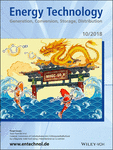
Energy Technology
Advancing the Future of Energy InnovationEnergy Technology, published by Wiley-VCH Verlag GmbH, is a prominent peer-reviewed journal dedicated to advancing the field of energy research and technology. With an ISSN of 2194-4288 and an E-ISSN of 2194-4296, this journal has made a significant impact in the energy sector, holding a Q2 category ranking in the Energy (miscellaneous) category for 2023, and proudly positioned in the 77th percentile within the Scopus ranking for General Energy. Since its inception in 2013, Energy Technology has consistently published cutting-edge research, innovations, and reviews that cater to a wide array of topics including renewable energy, sustainable technologies, and energy efficiency. The journal does not offer open access, yet it remains a key resource for researchers, professionals, and students who are committed to exploring the dynamic field of energy. The journal's efforts to disseminate rigorous scholarship make it an invaluable asset for anyone looking to contribute to or understand the future of energy-related technologies until 2024.

International Journal of Electrochemical Science
Exploring the electrochemical landscape of tomorrow.International Journal of Electrochemical Science is a peer-reviewed journal dedicated to disseminating cutting-edge research in the field of electrochemistry. Published by Elsevier in Serbia, this journal serves as a vital platform for scientists and researchers to explore innovative electrochemical techniques, processes, and applications. With an ISSN of 1452-3981, it has been a respected source of scholarly articles since its inception in 2006 and continues to bridge the gap between theoretical advancements and practical implementations up until 2024. Notably, it holds a Q4 quartile ranking in the field of electrochemistry and ranks 41 out of 60 in the Scopus database, situating it within the 32nd percentile among its peers. The journal champions open academic discourse, contributing significantly to the advancement of knowledge in electrochemical sciences, making it an essential resource for researchers, professionals, and students alike who are striving towards new discoveries and innovations.
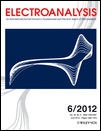
ELECTROANALYSIS
Bridging Theory and Application in Electrochemical ResearchELECTROANALYSIS is a premier journal published by WILEY-V C H VERLAG GMBH that serves the dynamic field of analytical and electrochemistry. Established in 1989, this scholarly publication has successfully converged its focus to cover a wide array of topics including novel electrochemical methods, sensor technology, and environmental analysis, reflecting the latest advancements and trends in the field. With an impressive 2023 impact factor that places it in the Q2 quartile of Analytical Chemistry and Q3 quartile in Electrochemistry, the journal is recognized for its high-quality research and contributions. Its Scopus rankings further reinforce its credibility, standing at #46/156 in Analytical Chemistry and #26/60 in Electrochemistry. Although currently not offering Open Access, the journal remains a significant resource for researchers, professionals, and students keen to stay at the forefront of electroanalytical techniques. With a global readership, ELECTROANALYSIS continues to drive knowledge and innovation within the scientific community.
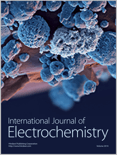
International Journal of Electrochemistry
Connecting researchers and professionals in the electrochemical landscape.The International Journal of Electrochemistry, published by HINDAWI LTD, serves as a premier outlet for cutting-edge research in the expansive field of electrochemistry. With an ISSN of 2090-3529 and an E-ISSN of 2090-3537, this open-access journal has been contributing to the advancement of scientific knowledge since 2011, making its content freely available to researchers, industry professionals, and students around the globe. The journal aims to foster innovation by disseminating high-quality research articles, reviews, and technical notes that encompass a wide range of topics from fundamental electrochemical principles to practical applications in energy storage, sensors, and material development. With a focus on promoting interdisciplinary collaboration and advancing the understanding of electrochemical systems, the International Journal of Electrochemistry is a vital resource for anyone involved in electrochemical research and its applications.
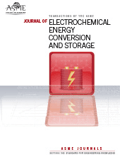
Journal of Electrochemical Energy Conversion and Storage
Innovating Electrochemical FrontiersThe Journal of Electrochemical Energy Conversion and Storage, published by ASME, is a premier platform for cutting-edge research in the fields of electrochemistry, energy engineering, and materials science. With an ISSN of 2381-6872 and an E-ISSN of 2381-6910, this journal aims to disseminate high-quality articles that contribute to the understanding and application of energy conversion and storage technologies. Notably recognized in the 2023 Category Quartiles as Q2 in multiple categories including Electronic, Optical and Magnetic Materials, Energy Engineering and Power Technology, and Mechanical Engineering, it reflects a strong academic impact within its field. The journal also boasts competitive Scopus rankings, highlighting its relevance and influence across disciplines. Operating under an open access model, the journal ensures that research findings are widely accessible, fostering collaboration and innovation among researchers, professionals, and students globally. As we move toward a more sustainable future, the Journal of Electrochemical Energy Conversion and Storage plays a critical role in advancing technologies that promise to reshape how we harness and utilize energy.